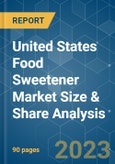The United States is among the world's prominent sugar producers. Unlike most other producing countries, the United States has both large and well-developed sugarcane and sugar beet industries. The demand for natural sweeteners is primarily due to the health food trend. The rising awareness regarding the harmful effects of excessive sugar consumption is augmenting the market's growth. Companies, such as Coca-Cola and PepsiCo, introduced products that contain natural sweeteners, which are expected to positively affect health. Companies are focusing on catering to the rising demand for low-calorie products. Currently, the US market is saturated in the case of natural and artificial sweeteners. Thus, the market is growing at a slow pace.
The demand for sugar substitutes in the country is expected to be fueled by increasing concerns regarding the health impact of excess sugar consumption on the average US diet. On the other hand, the same demand for natural sweeteners is an extension of a healthy food megatrend. Clear awareness regarding the harmful effects of excessive sugar consumption has led to companies in the country opting for natural sweeteners in their food and beverage applications. Consumers in the United States are increasingly seeking plant-based, zero-calorie sweeteners to live a healthier lifestyle. Hence, many food and beverage manufacturers are introducing zero-calorie sweeteners to cater to the consumer preferences.
US Food Sweetener Market Trends
Demand for Plant-based and Clean-label Solutions
The low-sugar, naturally sweet, plant-based ingredients witnessed a growing demand in the market, with monk fruit and stevia being two high-intensity plant-based sweeteners approved by FDA GRAS. The domestic demand for clean labels or natural food products is rising, owing to the growing consumer awareness about the negative health effects of artificial ingredients. In a survey conducted by the International Food Information Council, United States, in 2021, almost 48% of respondents claimed that they paid more attention to the ingredient list on goods and beverages than they did five years ago. Over 22% of respondents said they make an effort to buy foods and drinks with clean ingredients whenever they shop for groceries online.Clean label is now regarded as a standard in the food industry. A minimal, transparent, and recognizable ingredient list is highly demanded by consumers worldwide, which propels manufacturers to highlight the product's natural origin. Concerns about food handling and excessive usage of food additives, preservatives, sweeteners, and flavorings have led to the consumer demand for transparency in the label and the food supply chain. Food manufacturers are required to include the contents and place of origin on the label. This has led manufacturers to increase the usage of maple syrup in food applications, leading to a rise in the production of maple syrup in the country. Amid growing awareness of the ill effects of artificial additives, the lack of a clean label is proving to be a major restraint in the market.
Increased Application of Sweeteners Across the Bakery Industry
Some of the important functions of sweeteners in bakery products include sweetening, tenderizing, and batter aeration (crystallized sugars). Bakers across the country use sweeteners in biscuits, bread, rolls, cakes, cookies, crackers, doughnuts, and frostings across the United States. According to the Bureau of Labor Statistics, the United States had about 180,000 bakers in 2021. Along with the growth of the bakery industry, the sweetener market is thriving across the United States. Additionally, the rising preference for natural sweeteners in such baked products for health reasons is driving the market’s growth.Consumers across the United States are becoming increasingly sophisticated in their knowledge of health and wellness food products, and many are seeking to alter their diets accordingly. With the growth in food products catering to health-conscious consumers, there is an increase in demand for whole wheat, low-calorie or sugar-free, and gluten-free bakery products, creating potential for low-calorie sugar substitutes in the country. Companies across the region are including bakery ingredients in their portfolios and introducing stevia into their products. Not only does this provide businesses with options to avoid sugar taxes, but it encourages a healthier lifestyle for consumers, thus driving the market.
US Food Sweetener Industry Overview
The US food sweetener market is fragmented in nature, with several regional and international players operating in the market. The major players typically use strategies such as new product innovations and acquisitions to strengthen their position in the market. The major US food sweetener market players include Cargill Incorporated, Archer Daniels Midland Company, Tate & Lyle PLC, Ingredion Incorporated, and Südzucker AG. The companies in the market have also been strengthening their distribution network to gain a competitive advantage over the other sweetener providers in the market studied. The leading companies are focused on launching innovative, low-calorie, and natural ingredient-based products. Huge investments have been made in R&D to develop products for specific needs. Hence, for the forecast period, product innovation, expansion, and partnership are likely to have a strong demand. However, with diversification to facilitate the growing consumer demand, mergers and acquisitions are expected to show an uptick in the near future.Additional Benefits:
- The market estimate (ME) sheet in Excel format
- 3 months of analyst support
Table of Contents
Companies Mentioned (Partial List)
A selection of companies mentioned in this report includes, but is not limited to:
- Cargill Incorporated
- Archer Daniels Midland Company
- Stevia First Corporation
- Tate & Lyle PLC
- Ingredion Incorporated
- Barentz International BV
- Ajinomoto Co. Inc.
- Sanxinyuan Food Industry Corporation Limited
- Manus Bio Inc.
- Südzucker AG
- Roquette Frères
- Guilin Layn Natural Ingredients Corp.










